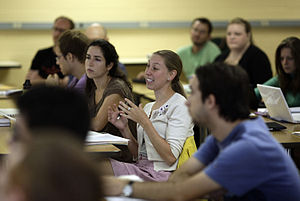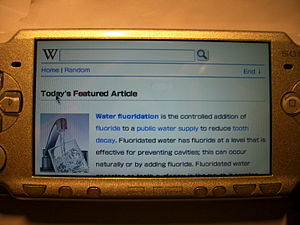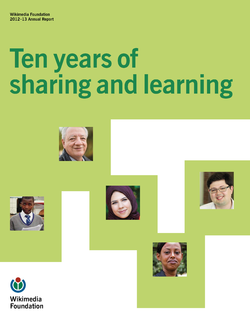Donations FAQ
Why should I donate to the Wikimedia Foundation?
The job of the Wikimedia Foundation is to provide easy access to information, for people all over the world—free of charge, and free of advertising. As a non-profit, it is dependent on your help to do that. Your donations directly support some of the most popular collaboratively-edited reference projects in the world, including Wikipedia, one of the world's top ten most popular websites and the largest encyclopedia ever compiled in human history.
What do you plan to do with my donation?
As Wikimedia Foundation founder Jimmy Wales put it: "Imagine a world in which every single human being can freely share in the sum of all knowledge."
We're serious about this vision. Every month, more than Template:COMSCORE-UNIQUES million people around the world already use Wikipedia. It's available online, on your mobile device, on DVD, in books, and many other forms. We aspire to reach everyone, and to continually provide more and better information.
Supported by an intense community-driven planning process, in 2010 the Wikimedia Foundation Board of Trustees set "big, hairy, audacious goals" for Wikimedia. These five-year targets (PDF) include increasing Wikimedia's global reach to 1 billion people and the number of articles in Wikipedia to 50 million. We're also setting out to dramatically increase and diversify participation, and to measure and improve quality of all Wikimedia content.
Wikimedia is not a traditional organization. It's a global movement. The core of the work is done by thousands of volunteers worldwide. This volunteer community is supported by a network of organizations, with the Wikimedia Foundation at its center, working in partnership with geographically focused local chapters in Template:CHAPTER-COUNT countries. It's our volunteer community that enables us to accomplish so much with so little.
These are some of the activities we're focused on right now:
 |
Operating the world's fifth largest web property. At its heart, the Wikimedia Foundation requires operational excellence to continue to exist. As of 2011, we're operating several hundred servers in three locations. While our global traffic continues to grow, our aim is to provide the best possible site experience to everyone in the world, to maximize uptime, and to ensure that all the information in Wikimedia projects is safe and secure.
Photograph: Wikimedia Foundation servers in our Florida hosting facility. |

|
Giving Wikimedia's volunteers the best possible tools to do their work. The core technology that makes Wikipedia and its sister projects possible, the wiki, was invented in 1995. Things have changed quite a bit since then. Wikimedia Foundation projects run on an open source wiki software called MediaWiki, which we develop and improve. Our goal is to make it as easy as possible to contribute knowledge, and to give volunteers and readers great tools for assessing and improving article quality. In some areas, we lead and innovate. At minimum, we must keep up with key trends in the ever-changing web we're part of. Because our software is open source, everyone can use and improve it. Photograph: Affinity diagram created based on Wikipedia usability research. |
|
Developing recruiting resources for new volunteers. Wikimedia is made of people. To grow our global community, we need to excite people about the prospect of being part of it – and help them with their first steps. To this end, we develop and maintain a library of outreach resources, such as videos and screencasts, but also printed "how-tos" and other more targeted resources (for teachers, librarians, students, and others). See the bookshelf of outreach resources. Video: Wikimedia volunteers speak about their motivations, shot at the Wikimania 2010 conference. Having trouble playing the video? View it on YouTube. | |

|
Staging outreach and community events world-wide. Once a year, hundreds of Wikimedia volunteers come together at Wikimania, in a different location around the world each year. And Wikimedia's chapter organizations have staged dozens of additional events, competitions and conferences around the world. Some are targeted at recruiting new volunteers; some give the community space to think about its work, and to do it. Recognizing the value of people coming together because they are passionate about Wikimedia's mission has been key to our success. Photograph: Participants of the "Free Your Knowledge" student competition in Indonesia listening to an introductory presentation (2010). |
 |
Partnering with cultural institutions. Galleries, libraries, archives, and museums protect and make available the world's history, culture and knowledge. Their mission is to serve and inform the public, just like Wikimedia's. We've successfully partnered with cultural institutions around the world – not just in working with them to make digital reproductions available for free, but also in improving Wikipedia articles and other content related to their collections and archives. Wikimedia chapters are playing a lead role in organizing conferences and meetings targeting the cultural sector, and executing partnerships.
Photograph: Wikipedia volunteers at a "backstage pass" event organized by the British Museum (2010). |
 |
Working with the educational sector. In the age of the open web, there's the potential for student projects to be more than just exercises. Pioneering professors have long assigned Wikipedia writing as coursework to their students. Everybody wins: students get an audience for their work, teachers successfully motivate their students, and readers get better articles. Wikimedia chapters have also reached out to schools to develop media literacy and to promote responsible use of Wikipedia in the classroom.
Photograph: Indiana University students of Barry Rubin's Seminar in Urban Economic Development are improving Wikipedia articles as part of their coursework. |

|
Providing access to Wikipedia everywhere. The next billion people to discover the web will do it using mobile phones, some without ever having touched a laptop. We need to make sure that our sites and services work both on modern smartphones and (to the extent it's possible) on lower-end devices. Our current mobile version is a start and we'll continue to improve it (including moving beyond the read-only experience). And for people with no or intermittent Internet access, we're supporting copies of Wikipedia that can be used completely offline, including projects like the WikiReader, offline readers for desktops and smartphones, and printed versions of Wikimedia content. Photograph: Wikipedia's mobile version works on the PlayStation Portable – and on your smartphone. |
|
Informing our decision-making with facts and data. Analytics, research, experiments and forecasts are essential to make good decisions in a complex environment like Wikimedia. The Wikimedia Foundation Report Card and the Statistics Portal provide a wealth of up-to-date analysis which helps us understand the impact of our work. Research projects provide us with in-depth analysis and experiments, supported by the volunteer-driven Research Committee. We're data nerds – what else would you expect from the kinds of people who love working on an online encyclopedia? Illustration: Projection regarding availability of mature language editions useful to different segments of the world's population. |
The Wikimedia Foundation isn't a start-up company that will fade away in a few years. We're in this for the long haul. Everything we do is aimed at providing you, and the rest of the world, with free and immediate access to all the world's knowledge. Join us!
How do I donate?
To donate, please visit our fundraising page. You can donate using any major credit card (including VISA, MasterCard, Discover or American Express), PayPal, bank transfer, bitcoin, or by sending a cheque to the Foundation. Our donation options support most (although not all) currencies.
Where do I send cheques?
Send cheques to:
Our preference is for cheques in U.S. dollars, drawn on U.S. bank accounts. Cheques in currencies other than U.S. dollars, or from bank accounts outside the U.S., can be very expensive for us to process, which reduces the value of your gift. If you do not have a U.S. bank account, you can maximize the value of your donation by giving via Paypal or wire transfer.
What other options exist to allow me to donate?
Alternative ways to donate to the Wikimedia Foundation include:
Why does the Wikimedia Foundation accept Bitcoin?
The Wikimedia Foundation, as a donor-driven organization, has a fiduciary duty to be responsible and prudent with its money, while striving to provide as many methods of donating as possible. Our donors indicated that they were interested in supporting us through Bitcoin, so after some investigation, we set up a method to accept those donations. See our blog post for more information about it.
Are my donations tax-deductible?
The Wikimedia Foundation is a registered 501(c)3 nonprofit organization, so donations are tax-deductible in the United States (tax ID number 20-0049703). Canadian citizens may also deduct their contribution on any income earned in the United States. Our tax exempt status varies in other countries. Please refer to our Tax Deductibility Guidelines for more information.
Donors from the U.K. can made a Gift Aid eligible donation to the Wikimedia Foundation through the UK Fund for Charities. If you donate through this platform, you will receive a receipt directly from the UKFC.
If I make a donation, how do I get my tax receipt?
All donors who give through our online donation flow will receive a tax receipt via email. Depending on the payment method used, it can take 1 - 7 business days for the receipt to arrive. Donors using an offline method such as sending a cheque will receive their receipt to the mailing address provided with the donation, unless they provide us with an email address. Please note when using offline methods that we recommend retaining a copy of your bank's confirmation of the donation for your records as well.
Can I give you a targeted or restricted donation to be used for something very specific?
The Wikimedia Foundation prefers unrestricted donations, so we can direct your donation to the area where the funds are most needed. Every restriction imposes administrative overhead and planning costs, and increases internal complexity. We accept restricted gifts on a case-by-case basis only. If you are interested in making a restricted gift, please contact Rosie Lewis, Development Associate, at rlewis@wikimedia.org.
Why is there a minimum donation?
We receive small donations from people who don't have much money, and we are really, really grateful to those donors.
Unfortunately it is not uncommon for people to use donation mechanisms such as ours to test stolen credit cards to see if they work. Those people typically use a very small amount for their testing: a $1 minimum donation amount seems to deter them.
If I can’t afford to donate, or don’t want to, what else can I do to support the Foundation?
There are many ways to show your support. Your time is just as important as a monetary contribution. For instance, you can teach a friend to edit Wikipedia or upload some of your photos to Commons under a free content license.
What does the Wikimedia Foundation do to ensure that my personal information is protected?
We are serious about protecting the privacy rights of our donors. Please see our Donor Privacy Policy.
What is your refund policy?
If for any reason you wish to have your donation refunded, please contact us via email at donate![]() wikimedia.org. We will need the following information in order to process your refund:
wikimedia.org. We will need the following information in order to process your refund:
- Date of donation (All refund requests must be made within 90 days of donation)
- Amount donated (Donations above USD $10,000 are considered major donations and are subject to the applicable grant agreement between the Foundation and the donor)
- Full name
- Payment method used (credit card, bank transfer, E-wallet, ...)
- Country of origin
- Reason for the refund
Please note that some payment methods may not support refunds, or require refunds to be made through the payment method (card) utilised, so additional information may be required to process your refund. All refunds will be processed as quickly as possible, but processing times may vary depending on the payment method.
We can only refund Bitcoin donations in Bitcoin. Because we do not store Bitcoins, refunds will be calculated based on the U.S. Dollar amount we received via instant exchange at the time of the donation, using our payment processor's Bitcoin sell rate when the refund is issued. The Wikimedia Foundation is not responsible for any change in value based on fluctuating exchange rates.
What can I do to help you spread the word?
Spread the word any way you can! Tell your friends and family. Put buttons and banners on your blog. Use this text as the sig file on the bottom of your e-mails:
Your donations keep Wikipedia running! Support the Wikimedia Foundation today: http://www.wikimediafoundation.org/wiki/Donate
How much money are you hoping to raise?
The 2014-15 plan posits revenue of $58.5 million from a 2013-14 projection of $50.1 million.
More details about our finances can be found in our financial reports. Here is our 2014-15 Plan (PDF), and here is the Questions and Answers page related to it.
Where can I find more financial information?
The Wikimedia Foundation 2012–13 annual report covers the fiscal year of July 1, 2012 to June 30, 2013. Now in its sixth edition, the Foundation's annual report celebrates the Foundation's first extraordinary decade, and shares some of the voices of the tens of thousands of people who make the Wikimedia movement possible.
The 2014-15 Annual Plan is our budget for the current fiscal year. It contains a summary of our strategic goals, financial details on spending and revenue, and detailed explanations and risk analysis.
Click the images below to download copies of our Annual Reports or our Annual Plan.
 |

|
| Download the 2012–13 Annual Report: | Download the 2014–15 Annual Plan: |

